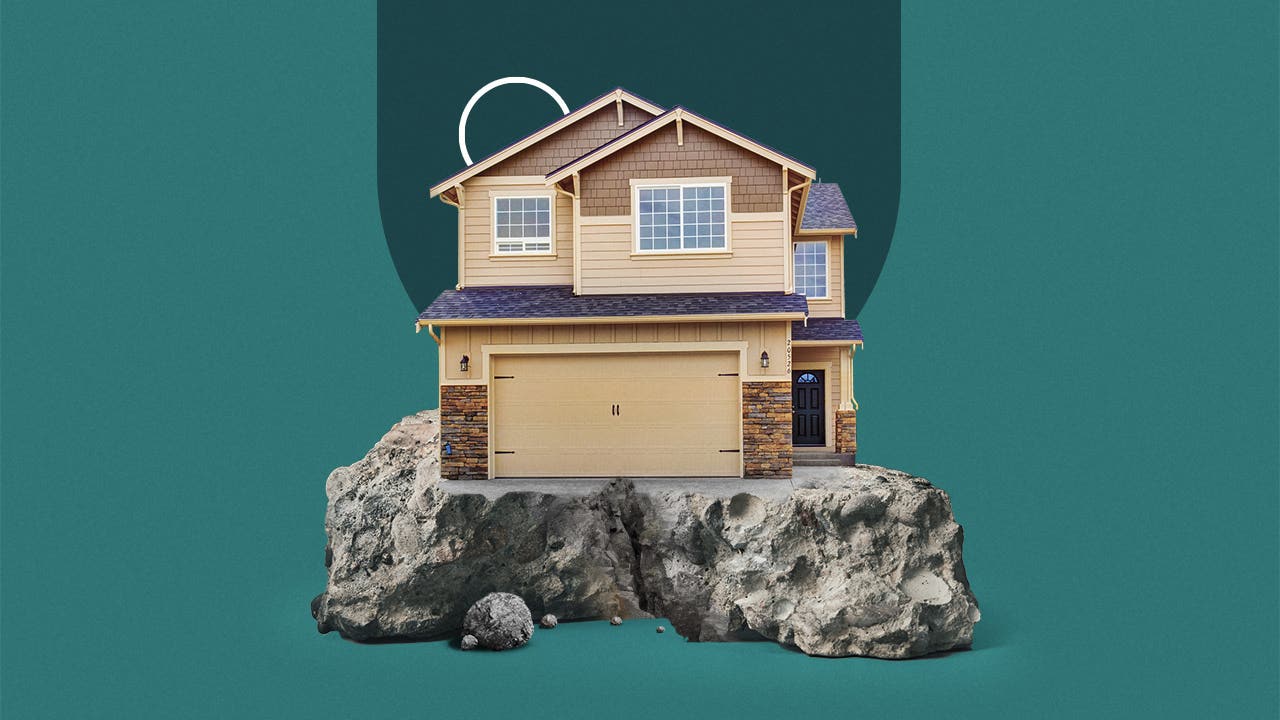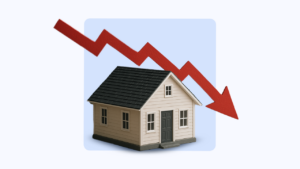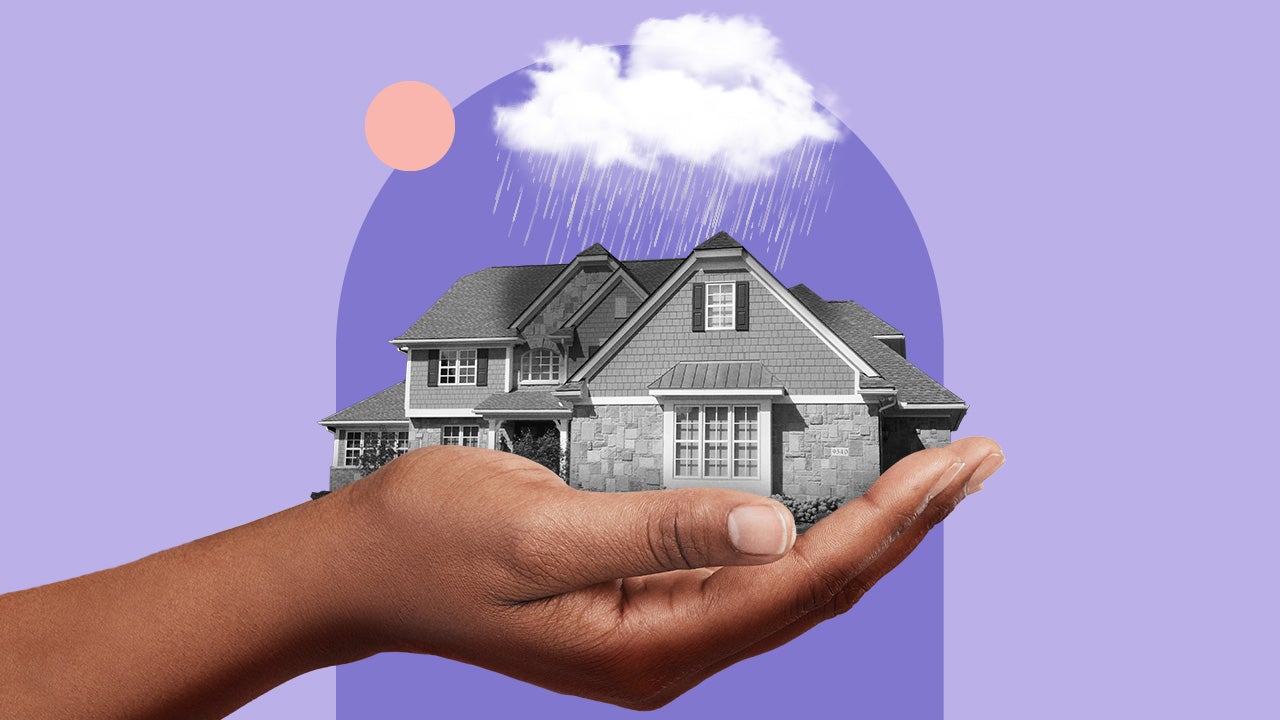Is the housing market going to crash? Here’s what the experts say

Key takeaways
- Home prices are still reaching historic highs, but they’ve begun to fall in some formerly hot markets.
- Meanwhile, the inventory of homes for sale is steadily increasing but still relatively low.
- Economists expect that any market correction will be modest and not a crash on the scale of the Great Recession.
To the dismay of would-be homebuyers, property prices in the U.S. just keep rising. Even during the dead of winter, when market activity typically slows to a crawl, it seemed nothing could stop the continued climb of home prices. Now, with the height of homebuying season upon us, are home prices destined for a fall? Here’s what the experts are saying about a potential housing market crash.
Home prices rise ever higher
After a pandemic-fueled surge, the U.S. housing market had finally started slowing in late 2022, and home prices seemed poised for a correction. But a strange thing happened on the way to the housing market crash: Home values started rising again. So much for the now-quaint notion that the post-pandemic “housing recession” would reverse some of the outsized price gains in homes.
The median price of an existing home in June 2025 — $435,300 — broke the record set last June for the highest median the National Association of Realtors (NAR) has ever recorded. Five years ago, during the early pandemic days of June 2020, the median sale price was just $294,400.
In another reflection of ongoing increases, the S&P CoreLogic Case-Shiller home price index released in June was up 2.7 percent from a year earlier.
The overall housing picture is mixed, though. Home values may be setting records, but the volume of home sales has plunged, and despite substantial inventory gains, levels are still too low to meet demand. Homeowners who locked in 3 percent mortgage rates several years ago are declining to sell — and who can blame them, with current rates more than double that? — so the supply of existing homes for sale is staying tighter. And tariffs are likely to hamper new construction. As a result, any correction will be nothing like the utter collapse of property prices during the Great Recession, when some housing markets experienced a 50 percent cratering of values.
That crash was driven in large part by a wave of foreclosures. But relatively speaking, foreclosures are nearly nonexistent today. As a result, says Lawrence Yun, chief economist at NAR, “A home price crash is an impossibility.”
Instead, this boom is far likelier to end in a soft landing. “You are seeing more supply coming on market, and houses taking longer to sell,” says Greg McBride, Bankrate’s chief financial analyst. “We’re going to see pretty tepid home price appreciation going forward.”
Ken H. Johnson, a housing economist at the University of Mississippi, agrees with that assessment. Home price appreciation overshot over the past few years, but now prices are being contained by the reality that values have stretched the bounds of affordability to the breaking point, he says.
“Today, home prices — while moderating a little — are significantly above predicted prices based on a history of past sales, while mortgage rates remain high,” Johnson says. “Does all of this mean we will have a significant decline in home prices? Probably not. Unlike the last housing crash, the nation is in the grips of a housing shortage, preventing a major decline in home prices.”
- According to Bankrate’s weekly national survey of large lenders, the average mortgage interest rate on a 30-year loan was 6.76 percent as of July 23.
- Existing-home sales in June fell 2.7 percent to 3.93 million, the National Association of Realtors says.
- The nationwide median sale price in June was $435,300, NAR says. That’s an all-time high and represents 24 consecutive months of year-over-year increases.
- In June, the housing market had a 4.7-month supply of housing inventory, an improvement from a year earlier but still below the five-to-six months needed for a healthy, balanced market — one that favors neither buyers nor sellers.
- A total of 187,659 U.S. homes had foreclosure filings — default notices, scheduled auctions or bank repossessions — in the first half of 2025, according to the latest numbers from ATTOM Data Solutions. That’s up 5.8 percent from a year ago.
Supply and demand
The main driver of record home prices is a one-two punch straight from Econ 101 — insufficient housing supply coupled with strong demand. Inventories have been growing but remain frustratingly tight. Not even high mortgage rates have slowed price appreciation. For instance, in October 2023, home values held steady even as mortgage rates soared to 8 percent, their highest level in more than 23 years.
The fundamental reason for the run-up in price is heightened demand and a lack of supply.— Greg McBride, CFA, chief financial analyst for Bankrate
Mortgage rates fell all the way to 6.2 percent in 2024, but they’ve since inched back up closer to 7, despite the three Fed rate cuts that closed out last year. The average rate for a 30-year fixed mortgage in Bankrate’s weekly survey released July 23 was 6.76 percent.
“The fundamental reason for the run-up in price is heightened demand and a lack of supply,” says McBride. “As builders bring more available homes to market and more homeowners decide to sell, supply and demand can come back into balance. It won’t happen overnight.”
Is the housing market going to crash?
Despite all this volatility, the answer is no. Housing economists and analysts agree that any market correction is likely to be modest — no one expects price drops on the scale of the declines experienced during the Great Recession.
A home price crash is an impossibility.— Lawrence Yun, Chief Economist, National Association of Realtors
There are still more buyers than sellers, and that means a meaningful price decline can’t happen: “There’s just generally not enough supply,” says Mark Fleming, chief economist at title insurer First American Financial Corp. “There are more people than housing inventory. It’s Econ 101.”
But in some markets, such as Austin, Texas, and Florida’s Bradenton-Sarasota region, just south of Tampa Bay, builders are delivering plenty of new homes. A Bankrate analysis of U.S. Census Bureau data shows that those two markets have the fastest pace of housing construction among metro areas with more than 900,000 residents.
Prices in these formerly hot markets have been falling, while prices are rising in areas in the Northeast and Midwest, where building activity is muted. By contrast, markets such as Peoria, Illinois, and Syracuse, New York, have experienced double-digit price growth — in part because there’s little new construction.
5 reasons there will be no housing market crash
Housing economists agree that even if prices do fall, the decline will not be as severe as the one experienced during the Great Recession. One obvious difference between now and then is that homeowners’ personal balance sheets are much stronger today than they were 15 years ago. The typical homeowner with a mortgage has stellar credit, a ton of home equity and a fixed-rate mortgage locked in at a rate much lower than today’s figures.
The experts point to five compelling reasons that no crash is imminent.
- Inventories are still too low: A balanced market typically has a five- or six-month supply of housing inventory, and NAR says there was a 4.7-month supply of homes for sale in June. (Back in early 2022, that figure was a tiny 1.7 months.)
- Builders aren’t building quickly enough to meet demand: Home builders pulled way back after the last crash, and they never fully ramped back up. Now, there’s no way for them to buy land and win regulatory approvals quickly enough to quench demand, so a repeat of the overbuilding of 15 years ago looks unlikely. Navigating the on-again, off-again tariff scenario, which could severely impact prices for lumber, steel and other crucial building materials, makes this even more difficult.
- Demographic trends are creating new buyers: There’s strong demand for homes on many fronts. Many Americans who already owned homes decided during the pandemic that they needed bigger places, especially with the rise of remote working. Millennials are a huge group and in their prime buying years, and Hispanics are a growing demographic also keen on homeownership.
- Lending standards remain strict: Back in 2007, “liar loans,” in which borrowers didn’t need to document their income, were common. Lenders offered mortgages to just about anyone, regardless of credit history. Today, lenders impose much tougher standards — and successful borrowers have excellent credit. The median credit score for new mortgage borrowers in mid-2024 was an impressive 772, the Federal Reserve Bank of New York says. “If lending standards loosen and we go back to the wild, wild west days of 2004-2006, then that is a whole different animal,” says McBride. “If we start to see prices being bid up by the artificial buying power of loose lending standards, that’s when we worry about a crash.”
- Foreclosure activity is muted: In the years after the housing crash, millions of foreclosures flooded the housing market, depressing prices. That’s not the case now. Most homeowners have a comfortable equity cushion in their homes. Lenders weren’t filing default notices during the height of the pandemic, pushing foreclosures to record lows in 2020. And while there has been an uptick in foreclosures since then, it’s nothing like it was.
All of that adds up to a consensus: Yes, home prices are pushing the bounds of affordability. But no, this boom shouldn’t end in bust.
FAQs
Why we ask for feedback Your feedback helps us improve our content and services. It takes less than a minute to complete.
Your responses are anonymous and will only be used for improving our website.






